In a digital age rife with cyber threats, Freemasonry’s enduring principles of liberty, equality, and fraternity provide a profound ethical compass. As we navigate the complex landscape of cybersecurity, these values can guide us toward equitable policies that protect human rights, ensuring a just digital future for all.
Masonic Reflections on Cybersecurity: Navigating Freedom and Security in the UN Cybercrime Convention
by Br. Martin Ignacio Díaz Velásquez.
Freemasonry, with its significant historical influence on international diplomacy, has played a crucial role in drafting treaties and creating multilateral organizations such as the United Nations.
As the threats from cyberspace grow, the ethical principles of Freemasonry offer a valuable perspective for addressing the contemporary challenges of cybersecurity and the protection of rights in the digital space.
Throughout history, these values—centered on liberty, equality, and fraternity—have guided leaders and diplomats in key moments, shaping the landscape of human rights and international cooperation (Conti, 2017; Önnerfors, 2017).
This article reflects on how Masonic ideals can offer essential guidance for tackling contemporary challenges, especially in the realm of cybersecurity and the prevention of cybercrime, where the UN Cybercrime Convention seeks to establish a legal framework that protects both global public security and fundamental rights.
In the digital age, cybercrime has emerged as a growing threat that challenges traditional concepts of sovereignty and justice.
The ethical and humanistic principles of Freemasonry are not just essential, but they are the cornerstone of ensuring that efforts to strengthen cybersecurity do not compromise human rights.
As the United Nations moves forward with the implementation of the Convention, it is vital that these ideals guide policy formulation to ensure that digital protection is carried out in harmony with the fundamental values of liberty, equality, and human dignity, which have been pillars of both Freemasonry and the United Nations.
This analysis explores how the history of Freemasonry and its legacy in international diplomacy can influence contemporary cybersecurity policies, ensuring a balance between security protection and the preservation of individual freedoms, while always respecting human dignity.
The Humanistic Diplomacy: Freemasonry’s Legacy in International Politics
When we speak of “politics” concerning Freemasonry, we refer to political science, a discipline that studies power, the state, governments, international relations, and collective decision-making processes.
Although Freemasonry prohibits the discussion of partisan and ideological politics in its meetings, this does not mean that Masons are detached from general political dynamics.
As human beings, we are “political animals” in the Aristotelian sense, participating in politics in its broadest sense: the organization of society and collective decision-making.
Despite not being involved in partisan politics, Freemasonry promotes universal values and principles such as liberty, equality, fraternity, justice, and humanism, impacting diplomacy discreetly yet powerfully. Throughout the 20th century, many Freemasons played critical roles in events like the creation of the League of Nations and the drafting of international treaties, promoting ideals of peace and cooperation (Conti, 2017).
Michel Foucault (1975) notes that power is not a fixed hierarchical structure but circulates through all social relationships, permeating institutions, norms, and individuals.
In this sense, Freemasonry has exerted its political influence not through partisan or ideological mechanisms but through the dissemination of universal principles and values, which have been crucial in the formation of international organizations such as the United Nations and in the drafting of treaties that promote justice (Conti, 2017; Berger, 2010).
Figures such as Franklin D. Roosevelt and Harry S. Truman, both prominent Freemasons, were instrumental in the creation of the United Nations, promoting a new world order based on cooperation and mutual respect (Macoy, 2008).
Their vision helped consolidate multilateral organizations, such as the UN, which continue to be essential in contemporary global governance.
The Universal Declaration of Human Rights drafting also reflects the principles of liberty, equality, and fraternity, which Freemasonry has historically promoted (Burgers, 1992; Bertomeu, 2018).
These ideals have guided the creation of treaties that remain relevant in the contemporary context, including the UN Cybercrime Convention. Masonic diplomacy also played a crucial role during the Cold War, facilitating dialogue in politically tense situations between leaders of both blocs (Carnes & Dale, 2007).
Freemasonry has discreetly influenced key moments in international diplomacy. Figures such as Franklin D. Roosevelt and Harry S. Truman, both Freemasons, played vital roles in the creation of the United Nations and the Universal Declaration of Human Rights.
William Maley (2022) describes this form of “secret diplomacy” as a method that allows key actors to explore solutions to complex problems without public intervention or scrutiny.
Notably, some Freemasons were influential in the framework of the 1919 Treaty of Versailles, where they played a decisive role in negotiations, consolidating a framework of international cooperation that would later lay the foundations for the creation of the League of Nations (Conti, 2017).
Masonic diplomacy, characterized by its discretion, continued to be a key tool during the Cold War, providing platforms for dialogue between opposing blocs and helping to reduce global tensions (Carnes & Dale, 2007; Scott-Smith 2008).
Freemasonry’s contribution to international diplomacy was not limited to specific events. Throughout the 20th century, Freemasonry, through its members who applied its values and principles, has historically advocated for a humanistic approach to international politics, influencing the creation of multilateral institutions designed to promote global justice and human rights.
This approach was key in consolidating an international order based on cooperation and humanitarian law, which continues to guide international policies in contexts such as the UN Cybercrime Convention (Önnerfors, 2017; Drubel & Mende, 2023).
Cybercrime and the UN Cybercrime Convention
In 2023, global cybercrime costs reached $8.44 trillion USD and are projected to rise to $23.84 trillion by 2027 (World Economic Forum, 2023).
The United Nations Convention against Cybercrime is a global response to the growing challenge posed by cybercrime in the digital age.
Its main objective is to provide an international legal platform that facilitates cooperation between states in combating cybercrime, protecting societies from threats that jeopardize privacy, data, and critical infrastructure.
However, this effort raises a central challenge: balancing the need for security with the protection of individual freedoms and privacy (Humble, 2021).
Cybercrime, which encompasses online fraud, identity theft, child exploitation, espionage, the spread of fake news, attacks on critical infrastructure, and incitement to hate, unfolds in a borderless environment.
In light of this, societies require a legal framework that guarantees security without compromising fundamental human rights (Knowmad Institute, 2024).
Cybercrime refers to illegal activities carried out via digital networks or computers, such as hacking, fraud, and identity theft.
Cyber delinquency, on the other hand, refers specifically to individuals engaging in these criminal activities.
Cybersecurity involves protecting systems and data from these crimes through tools like encryption, firewalls, and secure networks.
Digital attacks target data and systems, attempting to disrupt, steal, or damage. Meanwhile, hybrid attacks combine traditional crime methods (e.g., physical break-ins) with cyber tactics, amplifying the damage by attacking both physical and digital targets.
Cyber-Civility, Humanism, and Fraternity
Freemasonry, committed to humanistic values, offers a fundamental perspective. Throughout its history, it has advocated for a balance between security and individual freedoms, an essential vision for addressing the current challenges of cyberspace.
The principles of liberty, equality, and fraternity provide an ethical foundation to ensure that measures against cybercrime do not lead to mass surveillance or the erosion of human rights (Puyol González, 2018).
The principle of fraternity in cyberspace implies protecting users’ rights and promoting equitable access to digital technologies.
Measures must be proportional, respect privacy, and promote education on digital security, ensuring that security is not used as an excuse for repression or unnecessary surveillance.
65% of internet users believe that increasing cybersecurity measures should not compromise personal privacy. Finding a balance between digital freedom and security is becoming more challenging as cyberattacks continue to rise globally (World Economic Forum, 2023; Statista, 2023).
The history of Freemasonry, since its origins in the 18th century, has promoted ideals of cooperation, modernity, and social progress, especially on the international stage.
Martínez Esquivel (2017) points out that Freemasonry has played a crucial role in consolidating sociability networks and promoting justice and global peace, principles that today can also be applied to cyberspace.
It is important to emphasize that these Masonic principles do not directly apply to the technical aspects of cybersecurity but fundamentally influence the process of formulating public and private policies in this area.
Liberty guides the creation of policies that respect citizens’ privacy and digital autonomy. Equality is reflected in policies seeking equitable access to cybersecurity and digital justice.
Fraternity manifests in promoting international cooperation and shared responsibility in combating cybercrime.
These Masonic values provide an ethical framework for policymakers and business leaders when addressing the complex challenges of cyberspace governance, ensuring that resulting policies balance security with respect for fundamental rights.
The Masonic influence has been instrumental in creating a humanistic approach to global diplomacy. These ideals have shaped institutions like the United Nations, which promote justice and human rights.
In cybersecurity, this approach remains essential to ensure that technological progress does not compromise individual freedoms or human dignity (Gerjuoy, 2015).
Human rights, particularly in science and technology, have been defended in international forums, emphasizing the need for an ethical approach to technological advances.
The UN Cybercrime Convention reflects this balance. While it is crucial to establish a robust legal framework to regulate and prevent cybercrimes, it is equally important that this framework respects the humanistic principles that Freemasonry has historically promoted.
Masonic diplomacy highlights the relevance of a balanced approach, where security should not justify sacrificing fundamental rights (Knowmad Institute, 2024; Jonker et al., 2023).
The core principles of cyber-civility are:
1. Respect for the privacy of others.
2. Promotion of ethical digital behavior.
3. Responsible use of digital technologies.
Balancing Security and Freedom: The Role of Digital Education
A vital aspect of this debate is digital education. Freemasonry, emphasizing knowledge and intellectual progress, highlights the importance of educating citizens about the risks of cybercrime and cybersecurity.
Policies should not be limited to applying technical standards but should also foster a responsible digital culture and an awareness of rights and responsibilities in cyberspace (Knowmad Institute, 2024).
Moreover, integrating human and ethical values into digital systems, as hybrid and ethical artificial intelligence suggests, is essential to achieving meaningful human control over these systems.
In collaboration with AI, human reflection can ensure that technological systems respect fundamental rights (Jonker et al., 2023).
Ensuring that security measures are proportional, transparent, and respectful of privacy is vital. Technological advancements offer opportunities to create fairer and more equitable systems as long as an ethical and humanistic approach guides them.
Transparency in implementing surveillance technologies and education on cybersecurity align with Masonic ideals of justice and dignity (Puyol González, 2018).
Freemasonry has been crucial in promoting human rights and global justice throughout its history. In the digital age, these same principles can guide policies on cybercrime and cybersecurity, ensuring that technological solutions do not compromise fundamental freedoms. The UN Cybercrime Convention is an opportunity to build a solid framework that protects societies from cyber threats while respecting the humanistic values Freemasonry has defended for centuries (Önnerfors, 2017; Drubel & Mende, 2023).
Discussion:
Recommendations for the UN Cybercrime Convention Protocols
The approach toward cyber-civility and the protection of human dignity must be a key component in developing and implementing the UN Cybercrime Convention protocols.
Various actors—including civil society groups, NGOs, academics, and industry representatives—have expressed concerns about balancing digital security with fundamental freedoms throughout the formulation process.
These recommendations, grounded in Masonic principles and stakeholder feedback, aim to ensure that security measures do not compromise human rights and promote equitable digital justice.
Main Recommendations:
1. Protection of Human Rights and Cyber-Civility: The policies proposed as a result of the Convention must ensure that all digital interactions respect human dignity, prevent the criminalization of ethical behavior, and ensure that digital security is not used as an excuse for mass surveillance or the suppression of rights. The resulting legal framework must reflect cyber-civility principles, promoting ethical actions in cyberspace that protect both freedom of expression and privacy.
2. Transparency and Ethics in Cybersecurity: The Convention protocols must incorporate transparency and accountability mechanisms to ensure that cybersecurity measures (involving the prevention and prosecution of cybercrime) are implemented ethically. Oversight mechanisms must be independent and prevent the misuse of new governance as a tool to violate fundamental rights, especially in contexts of state surveillance and outsourced espionage.
3. Education on Cyber-Civility: A key focus should be creating educational programs that promote cyber-civility and responsible behavior in cyberspace. These programs should foster a culture of respect and digital ethics involving civil society and experts. Education should not be limited to technical aspects but should also address digital technology’s ethical and legal dimensions.
4. Safeguards for Human Rights: All cybersecurity policies and measures must explicitly safeguard privacy and freedom of expression. Surveillance and control measures in combating cybercrime should not justify the erosion of these fundamental rights, particularly in the context of vulnerable populations, such as migrants and displaced persons, who could be disproportionately affected by such policies.
5. Balanced International Cooperation: Effective global collaboration in combating cybercrime must be fostered without compromising each nation’s legal protection. This cooperation should ensure that states share information and develop joint strategies while maintaining a balance between security and respect for human rights. It is crucial that these alliances respect national laws and do not contribute to the creation of transnational surveillance networks that violate individual rights.
Cyber harassment and hybrid crimes, such as identity theft and online stalking, have seen exponential growth. In 2023, victims under 20 years old were particularly vulnerable, with a 100% increase in reported cyber harassment cases since 2020 (IC3, 2023; Cybersecurity Almanac, 2023).
Building Ethical Frameworks in Cyberspace
During the drafting process of the Convention, various stakeholders pointed out the importance of ensuring that cyberspace remains a safe but fair environment.
There are significant concerns about the possibility that the Convention could be used to justify mass surveillance, negatively affecting freedom of expression and privacy, particularly in the Global North, where vulnerable groups such as migrants and displaced persons may be more adversely impacted.
The principles of Freemasonry, with their focus on fraternity and justice, are well-positioned to influence the creation of ethical frameworks that ensure a balance between security and fairness in access to and use of cyberspace.
The Masonic principle of fraternity provides a solid foundation for formulating clear protocols that promote human rights and digital justice protection.
This approach is essential to ensure that international policies related to cybercrime do not erode human dignity or perpetuate discrimination.
Practical Application in Masonic Lodges: Leadership in Cyber-Civility
Historically, Freemasonry has defended the principles of civility, which is understood as ethical behavior based on mutual respect in all social interactions. These principles become even more relevant in the digital world, giving rise to cyber-civility.
This term refers to responsible and ethical behavior in cyberspace, which includes respecting the rights and privacy of others and promoting fair and equitable digital behavior.
Just as in the physical world, where Masons have defended justice and human dignity, cyber-civility is a natural extension of these values in the digital environment (Camps, 2018).
Digital Conduct Based on Masonic Principles
Cyber-ethics in cyberspace can and should be guided by the same principles that have defined Masonic action throughout the centuries: liberty, equality, and fraternity.
These values, vital in constructing international organizations and treaties, are equally applicable to cyberspace.
In an interconnected world dominated by emerging technologies such as artificial intelligence (AI), these tools must be used with respect for human dignity and equity (Munoz-Dardé, 2018).
AI and other advanced technologies amplify both the opportunities and risks in cyberspace, making it even more critical to establish strong ethical standards.
Best Digital Practices for Masonic Lodges
Masonic lodges should incorporate clear security and digital conduct practices into their organizational structures to consolidate a coherent and ethical approach to responsible digital conduct. These recommendations include:
1. Secure Authentication and Data Protection: Lodges should adopt security measures such as multi-factor authentication and encrypted communications to keep members’ information confidential and secure.
2. Responsible Online Behavior: Promote respectful and ethical digital interactions among members that reflect Masonic principles of respect and fraternity. These principles should govern interactions with emerging technologies, such as AI, avoiding biases and ensuring equitable and fair use.
3. Continuous Education: Include educational programs that address cybersecurity and promote digital ethics. This involves teaching members how to navigate cyberspace ethically and interact responsibly with emerging technologies such as AI.
4. Transparency and Accountability Protocol: In the event of cyber incidents or inappropriate behavior, lodges must have response mechanisms that promote transparency, accountability, and organizational learning to prevent future incidents.
Promoting an Ethical Digital Environment
Growing digital interdependence and emerging threats highlight the need for ethical behavior online. Freemasonry, as a defender of justice and civility in all aspects of life, is uniquely positioned to promote responsible digital behavior.
By developing and fostering a culture of respect and digital ethics, Masons can significantly contribute to creating a safer, more equitable, and respectful cyberspace (Knowmad Institute, 2024).
Since its origins, Freemasonry has promoted values of liberty, equality, and fraternity. In the digital world, these principles translate into promoting global digital cooperation, universal access to digital education, respecting privacy, and ensuring equitable access to technology.
Conclusion
Masonic lodges are responsible for promoting cyber-civility, integrating the principles of liberty, equality, and fraternity into digital policies and cybersecurity.
Creating a “Good Cybersecurity Practices Manual for Masonic Lodges” would help protect sensitive information and educate members about the importance of ethical behavior in the digital environment.
The UN Cybercrime Convention must reflect these values, ensuring that cybersecurity measures do not compromise human rights and that technological progress is grounded in mutual respect that transcends borders.
Cyber-civility is the new frontier for Masonic ethics, and as Masons and global citizens, we must contribute to a safer and fairer cyberspace for all.
In an increasingly interconnected world, Freemasonry is called to play a vital role in building an ethical framework for cybersecurity.
The principles of liberty, equality, and fraternity, which have guided its members throughout history, remain relevant and take on renewed significance in the face of the complexities of the digital environment.
The UN Cybercrime Convention represents a crucial effort to create an international legal framework protecting individuals and states from cyber threats. However, as with any technological advancement, there is the risk that security becomes a pretext for undermining human rights.
This is where the Masonic tradition, with its humanistic approach, can offer a balanced vision that ensures the protection of individual liberties without sacrificing security.
Freemasonry can lead an ethical approach to technology, not just in theory but also in practice, through promoting digital ethics education and adopting good digital practices within its lodges. The challenge is to protect information and build a digital culture that respects and promotes human dignity.
In this sense, balancing cybersecurity and freedom is not just a legal or technical challenge but also a moral and philosophical one.
The path to a safer and fairer cyberspace is a shared responsibility. Freemasonry, with its historic commitment to justice and human rights, has a prominent role in this journey toward the future.
Footnotes
Referances
1. Berger, J. (2010). European Freemasonries, 1850–1935: Networks and transnational movements. In European History Online (EGO). Leibniz Institute of European History. https://www.ieg-ego.eu/en/threads/european-networks/secret-societies/freemasonries-1850-1935
2. Burgers, J. H. (1992). The road to San Francisco: The revival of the human rights idea in the twentieth century. Human Rights Quarterly, 14(4), 447–477. http://humanrightsinitiative.ucdavis.edu/files/2012/10/burgerroadtosf.pdf
3. Camps, V. (2018). La fraternidad, condición de la justicia. Daimon. Revista Internacional de Filosofía, Suplemento, 7, 139–149. https://doi.org/10.6018/daimon/333491
4. Carnes, L., & Dale, H. C. (2007). Public diplomacy and the Cold War: Lessons learned. Heritage Foundation. https://www.heritage.org/defense/report/public-diplomacy-and-the-cold-war-lessons-learned
5. Conti, F. (2017). The Masonic International and the peace movement in the nineteenth and twentieth centuries. In J. Olmstead (Ed.), Reconsidering peace and patriotism during the First World War (pp. 33–50). Palgrave Macmillan. https://doi.org/10.1007/978-3-319-51301-0_2
6. Drubel, J., & Mende, J. (2023). The hidden contestation of norms: Decent work in the International Labour Organization and the United Nations. Global Constitutionalism, 12(1), 83–110. https://doi.org/10.1017/s2045381722000259
7. Foucault, M. (1975). Discipline and punish: The birth of the prison (A. Sheridan, Trans.). Pantheon Books. https://monoskop.org/images/4/43/Foucault_Michel_Discipline_and_Punish_The_Birth_of_the_Prison_1977_1995.pdf
8. Gerjuoy, E. (2015). The American Physical Society’s defense of human rights. APS Forum on the History of Physics Newsletter, Fall 2015, 1–4. https://arxiv.org/pdf/1512.06364v1
9. Humble, K. P. (2021). International law, surveillance, and the protection of privacy. The International Journal of Human Rights, 25(1), 34–54. https://doi.org/10.1080/13642987.2020.1763315
10. Jonker, C. M., Siebert, L. C., & Murukannaiah, P. K. (2023). Reflective hybrid intelligence for meaningful human control in decision-support systems. In M. Galli, M. Taddeo, & L. Floridi (Eds.), Research handbook on meaningful human control of artificial intelligence systems (pp. 102–120). Edward Elgar Publishing. https://arxiv.org/pdf/2307.06159v1
11. Knowmad Institut. (2024). Final report of recommendations on the UN Cybercrime Convention (May 2024). United Nations Office on Drugs and Crime. https://www.unodc.org/documents/Cybercrime/AdHocCommittee/Reconvened_concluding_session/Written_submissions/OP9/EN_Knowmad_Institutes_Final_Report_of_Recommendations_on_the_UN_Cybercrime_Convention_May_2024.pdf
12. Macoy, R. (2008). A General History of Freemasonry. Kessinger Publishing. ISBN 978-1425306427.
13. Maley, W. (2022). Secrecy and diplomacy. In Oxford Bibliographies. Oxford University Press. https://doi.org/10.1093/obo/9780199743292-0313
14. Muñoz-Dardé, V. (2018). Fellow feelings: Fraternity, equality, and the origin and stability of justice. Daimon. Revista Internacional de Filosofía, Suplemento, 7, 107–123. https://doi.org/10.6018/daimon/333881
15. Önnerfors, A. (2017). Freemasonry: A very short introduction. Oxford University Press. https://doi.org/10.1093/actrade/9780198796275.001.0001
16. Puyol González, Á. (2018). Libertad, igualdad, ¿y fraternidad? Daimon. Revista Internacional de Filosofía, Suplemento, 7, 5–9. https://doi.org/10.6018/daimon/337791
17. Martínez Esquivel, R. (2017). Historia global y francmasonería: 300 años de sociabilidad, modernidad e imperialismo. Revista de Estudios Históricos de la Francmasonería Latinoamericana y Caribeña, 9(2), 7–34. https://doi.org/10.15517/rehmlac.v9i2.31496
18. Scott-Smith, G. (2008). Aristotle, US public diplomacy, and the Cold War: The work of Carnes Lord. Foundations of Science, 13, 251–264. https://doi.org/10.1007/s10699-008-9138-7
19. Cybersecurity Almanac. (2023). 100 facts, figures, and statistics for 2023. Cybersecurity Ventures. https://cybersecurityventures.com
20. Federal Bureau of Investigation (FBI). (2023). 2023 internet crime report. Internet Crime Complaint Center. https://www.ic3.gov
21. Internet Crime Complaint Center (IC3). (2023). Internet crime report 2023. https://www.ic3.gov
22. Security Magazine. (2023). Top 5 key cyberattacks of 2023. https://www.securitymagazine.com
23. Statista. (2023). Global cybersecurity and privacy trends. https://www.statista.com
24. World Economic Forum. (2023). 2023 was a big year for cybercrime – Here’s how we can make our systems safer. https://www.weforum.org
25. Tiryaki, M. R. (2022). Freemasonry’s political and diplomatic entanglements in the last phase of Ottoman history: The peculiar case of the Committee of Union and Progress. Middle Eastern Studies, 59(3), 422–436. https://doi.org/10.1080/00263206.2022.2109147
Article by: Martin Ignacio Díaz Velásquez

Martin Diaz was initiated in 2012 in the Prometeo Lodge N° 367 in Buenos Aires, Argentina (GLA). He actively promotes open science, protection of the ethnosphere, and human dignity within Freemasonry.
As a Protestant bishop, Martin is committed to social research, human dignity, and the ethical adoption of emerging technologies.
He is currently the Executive Director of the Knowmad Institut in Germany, where he leads initiatives in human rights, emerging technologies, and sustainable development.
He also serves in the secretariat of the Rome Consensus 2.0 and is a One Young World ambassador. Martin is the author of numerous publications on humanitarian public policy and human rights.
Articles by Others: VR/AR/AI metaverse freemasonry
 The Great Algorithm of the Universe Explore the algorithmic essence of the Universe, from complex to simple and back again. Dive into the stochasticity of nature, the organic and inorganic omniverse, and the unexpected excellence of algorithmic data. Discover how repetitive processes yield extraordinary exceptions, much like the historic publication of the freemason’s constitutions. |
 Building a 21st Century Freemasonry Legacy: Freemasonry, rooted in the Middle Ages, values knowledge, equality, and fraternity. This article examines its historical influence on science and peace and its potential to continue this role. Understanding Freemasonry's relationship with science and peace is crucial for contributing to a fair, peaceful, and multipolar contemporary world. |
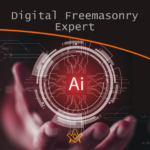 In the ever-evolving world of technology, artificial intelligence (AI) has revolutionized various industries, and now it's making its mark on Freemasonry. The Official Digital Freemasonry Community (ODFC) has introduced the "Digital Freemasonry Expert" AI tool, which aims to provide Masonic members with quick and accurate access to information, historical facts, and answers to their burning questions. This groundbreaking tool not only enhances the Masonic experience but also encourages dialogue and a deeper understanding of Masonic heritage. Join ODFC in embracing the digital transformation of Freemasonry and paving the way for innovation. |
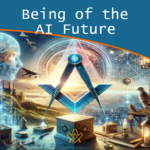 Being of the AI Future: Reflecting on the Knowledge of the Self Being of the AI Future; critically examines the shift from traditional power dynamics to data control in the AI era. It challenges us to rethink evolution and self-identity amidst AI's rise, highlighting Freemasonry's role and the need to balance technological progress with preserving human values. |
 The Virtual Goose and Gridiron In a digital era where virtual reality blurs the lines between the tangible and the intangible, Masonry explores the metaverse. Here, a Masonic Hall stands grand in the virtual expanse, its public symbols beckoning seekers and brethren alike. Within, curated materials and private chambers offer knowledge and connection, transcending physical limits. |
 Freemasonry and Generative AI – Part 2 Freemasonry meets Generative AI: Dive into the profound intersection of ancient Masonic principles and cutting-edge artificial intelligence. Explore the ethical conundrums, ontological debates, and the evolving role of AI in Masonic traditions. Will Brother AI soon join the Masonic ranks? A must-read for tech enthusiasts and Freemasons alike. |
 The article explores using Virtual Reality (VR) for Masonic rituals, offering immersive experiences beyond traditional methods. While VR ensures consistent quality and flexibility, it might reduce group interactions. The author suggests Masonic bodies consider VR for specific rituals, highlighting its future potential. |
 Venturing into the Virtual Lodge: A Revolutionary Approach to Freemasonry Unlock the celestial secrets of Freemasonry! Discover how Masonic rituals transcend physical boundaries, reaching for the stars in a VR space. Join us on a cosmic journey, where ancient traditions meet cutting-edge technology under the watchful eye of the comet above. The future of Freemasonry is here! |
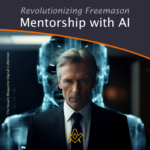 Revolutionizing Freemason Mentorship with AI Explore the intricate relationship between Freemasonry and mentorship in this captivating article. Unearth the rich history of this secretive fraternity, the symbol-laden rituals, and the transformative power of mentorship within the brotherhood. Delve into challenges faced and the potential impact of AI on Freemasonry mentorship. Immerse yourself in this intriguing journey! |
 The Future Use of Virtual Reality for Freemasonry Ritual Experience Freemasonry like never before! Dive into our ground-breaking research on harnessing Virtual Reality (VR) for Freemasonry rituals. We're transforming centuries-old traditions into immersive, accessible experiences. Discover how we're bridging the gap between historical symbolism and cutting-edge technology. Join us on this exciting journey into the future of Freemasonry! |
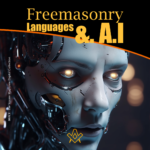 Unlock the enigmatic world of Freemasonry as we delve into its secret language. Explore the fascinating intersection of Generative AI and the Turin Test, unravelling the hidden codes and symbols that have intrigued generations. Discover the mysteries behind this ancient craft in our captivating introductory article. |
 Discover the exciting intersection of Freemasonry and AI. Explore how programming personal AI robots with Masonic principles like brotherly love, relief, and truth can revolutionize our interaction with technology, fostering a more ethical and empathetic AI future. Dive into the world of the Freemason AI robots now! |
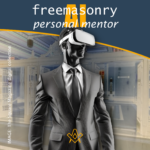 Imagine you are an AI-based personal development coach. Describe a subscription service that leverages cutting-edge technology and behavioural science to help users achieve their personal growth goals. What features would it have, and how would it keep subscribers engaged month after month? |
 Artificial Intelligence and its uses: from Society to Freemasonry Just as AI is not a panacea or a disaster, and the result depends on its use, so its application in Masonry will be beneficial and not counterproductive if the Brothers apply it constructively. By George Thanasoulas |
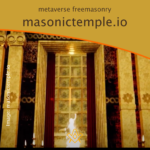 Metaverse freemasonry takes one step closer to become a reality as the Portuguese based company, Skyunicron, show case their Solomon Temple in the metaverse platform, a place for all Freemasons to meet in brotherly love and harmony, which at all times characterises freemasonry. Lets take a short tour….. |
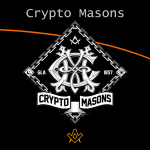 One of the first initiative for Masonic Art NFT collections with philanthropic goals supported by a regular Grand Lodge, in this case, the Great Lodge of Argentina of Free and Accepted Masons. |
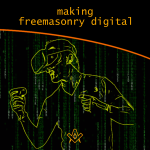 How do we prepare to make Freemasonry digital? Once we strip away the Masonic packaging, we are left with pure Freemasonry, which is not physical but content. |
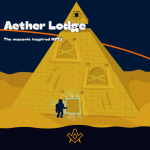 The vision is to satirize the many existing myths and preconceptions about Freemasonry by building a united community around an engaging story with multiple benefits. Aether Lodge consists of 9990 Masonic-themed NFTs divided into multiple collections. |
 What connects Freemasonry and Bitcoin ? Both are misunderstood and ridiculed by the ill-informed. If freemasonry is about being a better citizen of the world. Then Bitcoin is about: making the world a better place for all citizens |
 Metaverses, Masonry and Minecraft: The Future of Lodges Should Freemasons be proud that a clandestine group has borrowed their symbolism and ideology and transplanted it into a server known as ‘The Worst Place in Minecraft’? Metaverses, Masonry and Minecraft: The Future of Lodges |
 Freemasonry and the Metaverse P2 In this second instalment, Freemasonry and the Metaverse. We discusses the importance of being an open source protocol and how could Freemasonry benefit from a metaverse structure? |
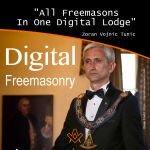 All Freemasons In One Digital Lodge; Is this viable?, is it practical ?, is it even possible ? To answer this question we need to under the problem "Digital Freemasonry" aims to fix. |
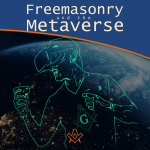 Freemasonry and the Metaverse P1 There is growing interest in the Freemasonry and the Metaverse on social media. Some projects are starting out as Masonic art NFT collections, while others are more clearly see a point in the future where they will be lodges operating in a metaverse. |
 Great Architect of the Metaverse Are you ready to meet in the metaverse ? what can you expect to see and do ? |
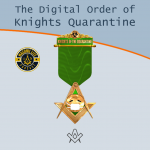 The Digital Order of Knights Quarantine Called “The Digital Order of Knights Quarantine”, it was advertised as “not-a-degree” because it was not an actual degree. |
 What would make a good Masonic phone app? Share one feature you would include in a phone app for Freemasons . . . |
masonic knowledge
to be a better citizen of the world
share the square with two brothers

click image to open email app on mobile device






